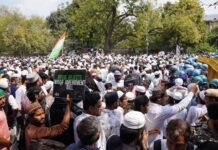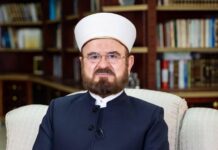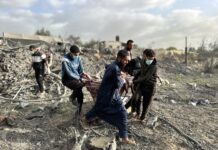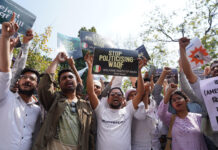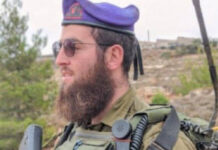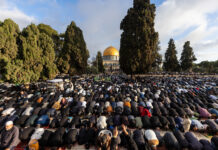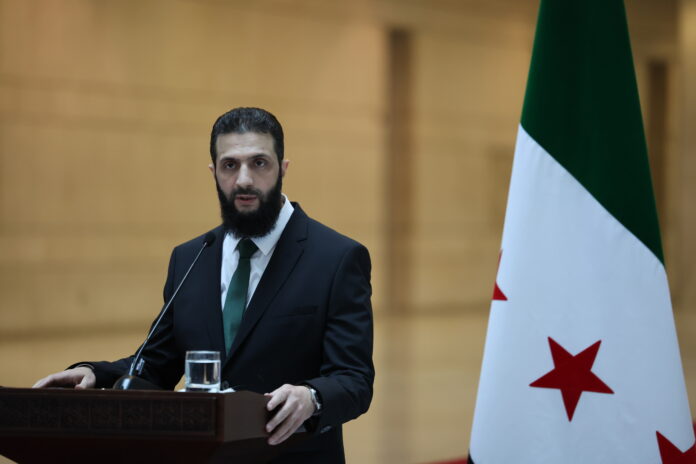
Syria’s de facto leader Ahmed al-Sharaa has told Al Arabiya TV that elections may not happen for four years since the process will require a full population count which will be a time-consuming process.
In his most comprehensive interview so far outlining his future vision for Syria, he told the Saudi-owned station that writing a new constitution could take three years, but added that people should see better public services within one year as part of immediate reforms.
Al-Sharaa outlined a vision of building a stable, prosperous and unified Syria by focusing on inclusivity, economic recovery and strong partnerships through its transitional phase towards lasting peace and development.
In other highlights from the interview:
Rebuilding Syria
Al-Sharaa highlighted his government’s ambitious plans to rebuild Syria’s economy and infrastructure, focusing on fairness, inclusivity, and creating opportunities for all. He stressed the importance of including every community in the rebuilding process so that no one feels left out or marginalised.
This approach, he noted, would help foster a sense of unity and cooperation among Syria’s diverse population. He said he remains committed to creating a united national identity that values Syria’s rich history and diversity, calling it the foundation for a strong and prosperous future.
Subscribe to our newsletter and stay updated on the latest news and updates from around the Muslim world!
Formation of new regime
Al-Sharaa defended the way government positions were chosen, saying it was necessary to keep things steady during this tough time, especially considering the fragile state of national institutions. He rejected the idea of dividing power between different groups, arguing it could create instability and slow down progress.
HTS
Al-Sharaa also announced plans to dissolve Hayat Tahrir al-Sham, the leading Syrian group behind the overthrow of Bashar al-Assad, during a National Dialogue Conference. This, he said, is an essential step towards achieving lasting peace and stability in the region.
“A country cannot be run by the mentality of groups and militias.. We will not work on exporting the revolution. We want to manage the phase with the mentality of the state and not revolution.”
Israel
Al-Sharaa emphasized that Syria is not seeking new conflicts, particularly with Israel, stating: “We are not looking to engage in a conflict with Israel and cannot bear such a battle.” He highlighted the country’s focus on reconstruction and stability following years of war.
He advocated for diplomatic approaches to ensure security and stability, cautioning against “ill-considered military adventures.”
Saudi Arabia
Al-Sharaa praised Saudi Arabia for its help in stabilising Syria and saw many opportunities for the Kingdom to invest in rebuilding the country. He expressed his gratitude for Saudi Arabia’s ongoing efforts and said he hopes to visit the city of Riyadh again, recalling fond memories of his childhood spent there.
Iran
On Iran, he asked its leaders to rethink their actions in the region, urging a shift towards cooperation and mutual understanding. He pointed out that opposition forces worked hard to protect Iranian areas during the conflict with Assad’s regime, yet were disappointed by Iran’s lack of positive response. He noted that such gestures would go a long way in improving relations between the two nations.
“Syria cannot continue without relations with an important regional country like Iran, but they must be based on respect for the sovereignty of both countries and non-interference in the affairs of both countries”
Al-Sharaa noted the removal of Iranian forces from Syria, stating: “We were able to end the Iranian presence in Syria, but we are not enemies of the Iranian people.”
USA
Al-Sharaa also expressed hope that the Trump administration would lift the sanctions imposed on Syria, saying it would mark a significant change from the previous U.S. policies. He emphasised that lifting sanctions would benefit both Syria and the broader region by promoting economic recovery.
“The sanctions on Syria were issued based on the crimes that the regime committed.” He added: “These sanctions should be removed automatically.”
Russia
On relations with Russia, Al-Sharaa emphasised the importance of keeping a strong partnership with one of the world’s leading powers. He appreciated Russia’s consistent support during the conflict and stressed the need to manage its withdrawal carefully to avoid creating a power vacuum or instability. He believed working with Russia would be key to ensuring long-term security and stability for Syria and the region.
Al-Sharaa also highlighted the strategic importance of continued dialogue with Moscow, especially in rebuilding Syria’s infrastructure and enhancing its defense capabilities.
“Russia is an important country and is considered the second most powerful country in the world.” He emphasised: “We do not want Russia to leave Syria in the way that some wish.”
United Nations
He criticised the United Nations for failing to secure the release of prisoners or help refugees return home, calling for more meaningful efforts from global organizations instead of empty promises. He expressed frustration with the international community’s inability to address the urgent needs of the Syrian people.
Right to protest
He also supported people’s right to protest as long as it doesn’t damage public property or hinder rebuilding efforts.
Dealing with Kurdish forces
Al-Sharaa mentioned ongoing discussions with the Kurdish-led Syrian Democratic Forces (SDF) to settle issues in the northeast and bring them into the national military. These talks aim to integrate the SDF into Syria’s armed forces while respecting the diverse backgrounds of its members.
He made it clear that Syria will not be divided under any circumstances and highlighted the importance of maintaining territorial integrity.
“We reject Syria becoming a platform for the Kurdistan Workers Party (PKK) to launch attacks … .” He proposed that the SDF integrate into the national armed forces, stating, “We will open a negotiations dialogue with the SDF… to perhaps find an appropriate solution.”







